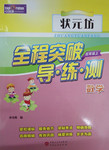题目内容
I like reading books about ________ story of Sang Lan who has ________ positive attitude towards life.
A. the;the B. a;a
C. a;/ D. the;a
练习册系列答案
 状元坊全程突破导练测系列答案
状元坊全程突破导练测系列答案
相关题目
题目内容
I like reading books about ________ story of Sang Lan who has ________ positive attitude towards life.
A. the;the B. a;a
C. a;/ D. the;a
 状元坊全程突破导练测系列答案
状元坊全程突破导练测系列答案